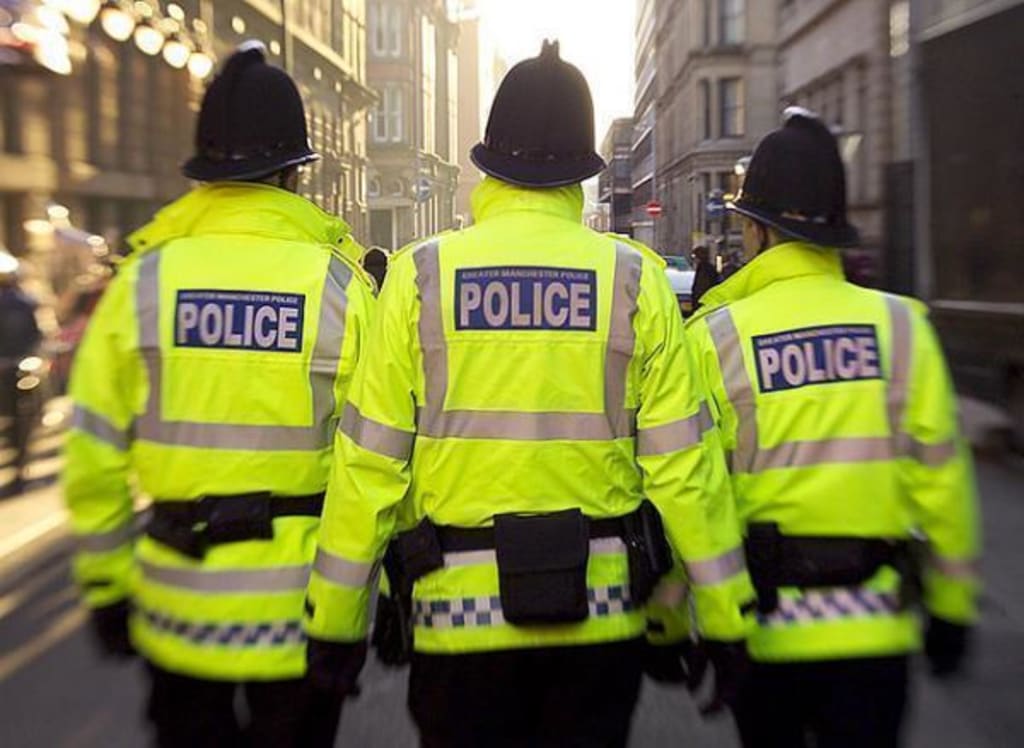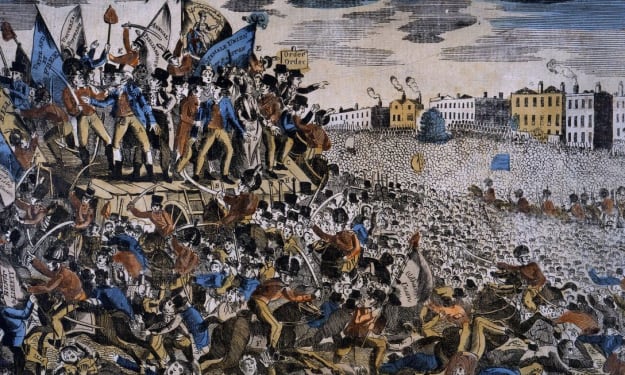Greater Manchester Wants Police-Free Schools
Andy Burnham's plans for school based police officers will divide Communities and Fail Young People

In January of this year it was revealed that the number of homicides across the United Kingdom had fallen for the first time in 5 years. Yet the perception remains that, as a nation, we face a growing threat from violent crime and in particular from knife crime. It's a perception that evokes strong reaction, especially when the human cost of carrying a weapon hits home in our communities. Even a single life lost due to carrying a knife is one life too many.
Falling statistics should not be used to mask or downplay the seriousness of violent crime but they are welcome in a climate of national discourse in which we only ever hear knife crime spoken of in terms of political rhetoric which is, at best, saturated with hyperbole and at worst cynically manipulated to deride and divide working class communities.
The only way an issue as serious and complex as violent crime can ever be addressed is through evidence based policy making. In Manchester homicides have fallen from a total of 64 in 2018 to 39 in 2019 according to BBC research but the dry statistics don't tell us how many young people feel the need to carry a knife with them to school and they give us no insight into the complex range of emotions and motivations which lead a young person to take the decision to carry a weapon.
Manchester's Metropolitan Mayor, Andy Burnham, wants to combat the threat of knife crime by hiring twenty new police officers, to be stationed full-time in schools in communities which he believes to be 'most at risk'. Burnham claims that this is the response that communities are asking him for but in reality this has less to do with community consent and more to do with a handful of Greater Manchester's head teachers who have been consistently lobbying for school-based police officers (SBPOs) over the last few years.
Whilst it may appeal to the Mayors desire to 'talk tough' on crime, his proposed role out of SBPOs is deeply reactionary, divisive and at odds with evidenced based policy elsewhere in the UK. Andy Burnham is pursuing a policy which will not only fail to combat violent crime, but will also alienate Manchester's most vulnerable young people, undermine the long term strategic needs of the regions police force and distance schools and teachers from the communities they serve.
Aside from the distinct absence of any meaningful consultation with students, parents, teachers or community groups there is also a distinct lack of evidence that school based policing leads to a reduction in violent crime amongst young people. According to the British Medical Journal, the hours between which under 16s are at the highest risk from violent crime are 4pm - 6pm. So we can only question the logic of a policy which would target 9am - 3pm school hours. Correspondingly, there is an abundance of evidence telling us that school based policing leads to detrimental outcomes for young people and there is particular cause for concern when we consider the consequences for black and ethnic minority communities.
In the United States - where experience with SBPOs is more commonplace - there has been a notable spike in racially motivated arrests contributing to what is coming to be known as the 'school-to-prison pipeline'. Here in the UK - as a result of existing police tactics such as 'stop and search', 'Operation Sycamore' and 'Prevent' - we already know that people of colour are over policed. Officers are disproportionately likely to be placed in working class communities and communities with higher proportions of students of colour. Introducing police into the school environment would change schools from places of support and safety, to places of punitive social control. Matters of the playground would quickly become matters for the criminal justice system.
Police officers in schools also cause significant complications when it comes to sexual health and education. In the Northwest, young people have access to organisations like Brook, who exist to provide support and sexual health advice. By maintaining a presence in schools, these organisations play a vital role in providing holistic sex education, often filling lamentable gaps in the national curriculum and ensuring that LGBTQ young people have the same access to advice, support and resources as their straight classmates. These sexual health experts operate on the front-line of issues such as grooming and staying safe online, contraception advice and recognising abusive behaviour.
The reality is that underage sex is a crime, even when both partners are underage. However, no one really thinks that it would be appropriate to brand a young person with a criminal record for doing something which any adult can do free from reproach. That's why sexual health workers are able to exercise discretion. They don't report issues of underage sex to the police where there is safety and consent and only pass on information where it is clear that a young person is at risk of harm or exploitation. A school based police officer does not have the luxury of discretion. If an officer comes to learn about a crime then that officer has a duty to act.
A school based police officer is therefore not conducive to the kind of environment that is required in order to promote sexual health and well-being and will lead to sexual health workers being unable to give advice for fear of incriminating the young people in their care. For something as innocuous as underage sex a young person who is reprimanded by police can expect a criminal record which would show up on a DBS check as a sexual offense with a minor. Regardless of their age at the time of the incident a record like that would follow a person for life with devastating consequences for their future prospects.
But there are alternative methods for reducing violent crime amongst young people that do not involve policing the classroom.
Not so long ago, Glasgow had a reputation for being the most murderous city in Europe. The reason that is no longer the case is because Scottish authorities recognised the continued failure of traditional policing methods and instead decided to treat violent crime as a public health concern. Violent Crime Reduction Units were set up to work hand in glove with communities bringing together schools, mental health workers, social workers and community leaders as well as former gang members and ex-offenders. The result was a drastic reduction in knife crime and gang related violence. The Glasgow model was so successful that it is now being rolled out across London too.
So on the one hand we have a public health approach which is empirically grounded in evidence and fact and on the other we have a policy of policing schools which offers absolutely no credible evidence of success and threatens to undermine public trust and disenfranchise working class young people.
Manchester's Mayor has a responsibility to set the agenda and shape - rather than simply follow - public opinion. Glasgow has provided us with a blueprint to make our communities safer. It is a model which can be built upon. Andy Burnham presides over one of the largest metropolitan budgets in the country but he lacks the political will to lead by example. By implementing a public health approach alongside proper educational funding and mental health support Manchester can show the way forward on violent crime reduction, empowering young people and bringing communities together. But that is not the path Andy Burnham is choosing, he is setting a dangerous precedent for the rest of the country and he is failing young people across Greater Manchester.
Manchester deserves the same lateral thinking that is granted London and Scotland, it begins with strong opposition to Andy Burnham's roll-out of school based police officers.
About the Creator
Shaun Ennis
Shaun from Manchester. Liberal Democrat Councillor representing Timperley Central on Trafford Council.






Comments
There are no comments for this story
Be the first to respond and start the conversation.